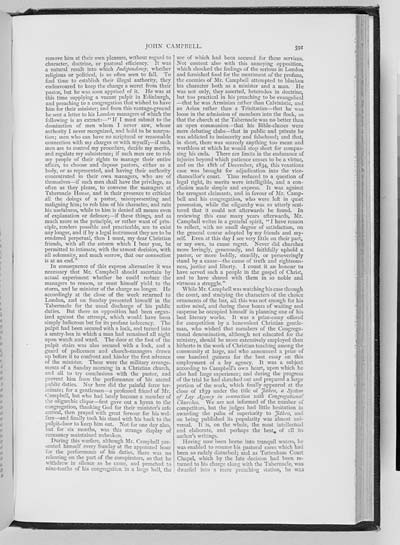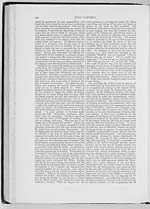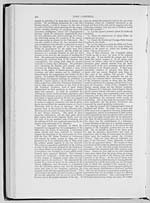Volume 3 > Half-Volume 6
(237) Page 591
Download files
Individual page:
Thumbnail gallery: Grid view | List view

591 remove him at their own pleasure, without regard to character, doctrine, or pastoral efficiency. It was a natural result into which Independency, whether religious or political, is so often seen to fall. To find time to establish their illegal authority, they endeavoured to keep the change a secret from their pastor, but he was soon apprised of it. He was at this time supplying a vacant pulpit in Edinburgh, and preaching to a congregation that wished to have him for their minister; and from this vantage-ground he sent a letter to his London managers of which the following is an extract:�"If I must submit to the domination of men whom I never saw, whose authority I never recognized, and hold to be usurpa- tion; men who can have no scriptural or reasonable connection with my charges or with myself;�if such men are to control my procedure, decide my merits, and regulate my subsistence; if such men are to rob my people of their rights to manage their entire affairs, to choose and depose pastors, either as a body, or as represented, and having their authority concentrated in their own managers, who are of themselves�if such men shall have the privilege, as often as they please, to convene the managers at Tabernacle House, and in their presence to criticize all the doings of a pastor, misrepresenting and maligning him; to rob him of his character, and ruin his usefulness, while to him is denied all means even of explanation or defence;�if these things, and as much more as the principle, or rather want of prin- ciple, renders possible and practicable, are to exist any longer, and if by a legal instrument they are to be rendered perpetual, then I must, my dear Christian friends, with all the esteem which I bear you, be permitted to intimate, with the utmost decision, with all solemnity, and much sorrow, that our connection is at an end." In consequence of this express alternative it was necessary that Mr. Campbell should ascertain by actual experiment whether he could reduce the managers to reason, or must himself yield to the storm, and be minister of the charge no longer. He accordingly at the close of the week returned to London, and on Sunday presented himself hi the Tabernacle for the usual discharge of his public duties. But there an opposition had been organ- ized against the attempt, which would have been simply ludicrous but for its profane indecency. The pulpit had been secured with a lock, and turned into a sentry-box in which a man had remained all night upon watch and ward. The door at the foot of the pulpit stairs was also secured with a lock, and a guard of policemen and church-managers drawn up before it to confront and hinder the first advance of the minister. These were the military arrange- ments of a Sunday morning in a Christian church, and all to try conclusions with the pastor, and prevent him from the performance of his sacred public duties. Nor here did the painful farce ter- minate; for a gentleman�a professed friend of Mr. Campbell, but who had lately become a member of the oligarchic clique�first gave out a hymn to the congregation, thanking God for their minister's safe arrival, then prayed with great fervour for his wel- fare�and finally took his stand with his back to the pulpit-door to keep him out. Not for one day also, but for six months, was this strange display of recusancy maintained unbroken. During this warfare, although Mr. Campbell pre- sented himself every Sunday at the appointed hour for the performance of his duties, there was no relenting on the part of the conspirators, so that he withdrew in silence as he came, and preached to nine-tenths of his congregation in a large hall, the use of which had been secured for these services. Not content also with this annoying opposition, which shocked the feelings of the serious in London and furnished food for the merriment of the profane, the enemies of Mr. Campbell attempted to blacken his character both as a minister and a man. He was not only, they asserted, heterodox in doctrine, but too practical in his preaching to be evangelical �that he was Arminian rather than Calvinistic, and an Arian rather than a Trinitarian�that he was loose in the admission of members into the flock, so that the church at the Tabernacle was no better than an open communion�that his Bible-classes were mere debating clubs�that in public and private he was addicted to insincerity and falsehood; and that, in short, there was scarcely anything too mean and worthless at which he would stop short for compas- sing his ends. There are limits in the endurance of injuries beyond which patience ceases to be a virtue, and on the 18th of December, 1834, this vexatious case was brought for adjudication into the vice- chancellor's court. Thus reduced to a question of legal right, its merits were intelligible, and a con- clusion made simple and express. It was against the arrogant claimants, and in favour of Mr. Camp- bell and his congregation, who were left in quiet possession, while the oligarchy was so utterly scat- tered that it could not afterwards be found. In reviewing this case many years afterwards, Mr. Campbell writes in a grateful spirit, " I have reason to reflect, with no small degree of satisfaction, on the general course adopted by my friends and my- self. Even at this day I see very little on their part, or my own, to cause regret. Never did churches more lovingly, generously, and faithfully uphold a pastor, or more boldly, steadily, or perseveringly stand by a cause�the cause of truth and righteous- ness, justice and liberty. I count it an honour to have served such a people in the gospel of Christ, and to have shared with them in so noble and virtuous a struggle." While Mr. Campbell was watching his case through the court, and studying the characters of the choice ornaments of the bar, all this was not enough for his active mind, and during these hours of waiting and suspense he occupied himself in planning one of his best literary works. It was a prize-essay offered for competition by a benevolent Christian gentle- man, who wished that members of the Congrega- tional denomination, although not educated for the ministry, should be more extensively employed than hitherto in the work of Christian teaching among the community at large, and who announced a prize of one hundred guineas for the best essay on this employment of a lay agency. It was a subject according to Campbell's own heart, upon which he also had large experience; and during the progress of the trial he had sketched out and prepared a large portion of the work, which finally appeared at the close of 1839 under the title of Jethro, a System of Lay Agency in connection with Congregational Churches. We are not informed of the number of competitors, but the judges had little hesitation in awarding the palm of superiority to Jethro, and on being published its popularity was almost uni- versal. It is, on the whole, the most intellectual and elaborate, and perhaps the best, of all its author's writings. Having now been borne into tranquil waters, he was enabled to resume his pastoral cares which had been so rudely disturbed; and as Tottenham Court Chapel, which by the late decision had been re- turned to his charge along with the Tabernacle, was dwarfed into a mere preaching station, he was
Set display mode to:
![]() Universal Viewer |
Universal Viewer | ![]() Mirador |
Large image | Transcription
Mirador |
Large image | Transcription
Images and transcriptions on this page, including medium image downloads, may be used under the Creative Commons Attribution 4.0 International Licence unless otherwise stated. ![]()
| Biographical dictionary of eminent Scotsmen > Volume 3 > Half-Volume 6 > (237) Page 591 |
|---|
| Permanent URL | https://digital.nls.uk/74514748 |
|---|---|
| Attribution and copyright: |
|
| Description | Volume III. Contains names alphabetically from Macadam to Young. |
|---|

